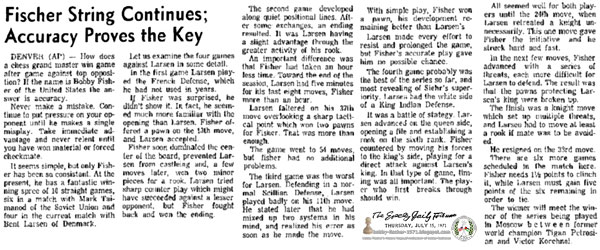Greeley Daily Tribune Greeley, Colorado Thursday, July 15, 1971 - Page 7
Fischer String Continues; Accuracy Proves the Key
Denver (AP) — How does a chess grand master win game after game against top opposition? If the name is Bobby Fischer of the United States the answer is accuracy.
Never make a mistake. Continue to put pressure on your opponent until he makes a single misplay. Take immediate advantage and never relent until you have won material or forced checkmate.
It seems simple, but only Fischer has been so consistent. At the present, he has a fantastic winning spree of 10 straight games, six in a match with Mark Taimanov of the Soviet Union and four in the current match with Bent Larsen of Denmark.
Let us examine the four games against Larsen in some detail.
In the first game Larsen played the French Defense, which he had not used in years.
If Fischer was surprised, he didn't show it. In fact, he seemed much more familiar with the opening than Larsen. Fischer offered a pawn on the 13th move, and Larsen accepted.
Fischer soon dominated the center of the board, prevented Larsen from castling and, a few moves later, won two minor pieces for a rook. Larsen tried sharp counter play which might have succeeded against a lesser opponent, but Fischer fought back and won the ending.
The second game developed along quiet positional lines. After some exchanges, an ending resulted. It was Larsen having a slight advantage through the greater activity of his rook.
An important difference was that Fischer had taken an hour less time. Toward the end of the session, Larsen had five minutes for his last eight moves, Fischer more than an hour.
Larsen faltered on his 37th move overlooking a sharp tactical point which won two pawns for Fischer. That was more than enough.
The game went to 54 moves, but Fischer had no additional problems.
The third game was the worst for Larsen. Defending in a normal Sicilian Defense, Larsen played badly on his 11th move. He stated later that he had mixed up two systems in his mind, and realized his error as soon as he made the move.
With simple play, Fischer won a pawn, his development remaining better than Larsen's.
Larsen made every effort to resist and prolonged the game, but Fischer's accurate play gave him no possible chance.
The fourth game probably was the best of the series so far, and most revealing of Siehr's superiority. Larsen had the white side of a King's Indian Defense.
It was a battle of strategy. Larsen advanced on the queen side, opening a file and establishing a rook on the sixth rank. Fischer countered by moving his forces to the king's side, playing for a direct attack against Larsen's king. In that type of game, timing was all important. The player who first breaks through should win.
All seemed well for both players until the 24th move, when Larsen retreated a knight unnecessarily. This one move gave Fischer the initiative and he struck hard and fast.
In the next few moves, Fischer advanced with a series of threats, each more difficult for Larsen to defend. The result was that the pawns protecting Larsen's king were broken up.
The finish was a knight move which set up multiple threats, and Larsen had to move at least a rook if mate was the be avoided.
He resigned on the 33rd move. There are six more games scheduled in the match here. Fischer needs 1½ points to clinch it, while Larsen must gain five points of the six remaining in order to tie.
The winner will meet the winner of the series being played in Moscow between former world champion Tigran Petrosian and Viktor Korchnoi.























